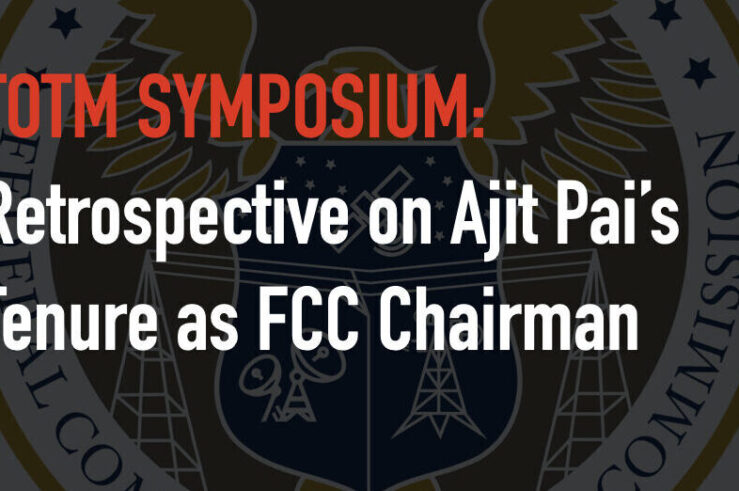Showing archive for: “Administrative Law”
How Chairman Pai Restored the FCC’s Independence
Chairman Ajit Pai will be remembered as one of the most consequential Federal Communications Commission chairmen in history. His policy accomplishments are numerous, including the repeal of Title II regulation of the internet, rural broadband development, increased spectrum for 5G, decreasing waste in universal service funding, and better controlling robocalls. Less will be said about ... How Chairman Pai Restored the FCC’s Independence
The (Conventional) 5G Chairman
Chairman Ajit Pai prioritized making new spectrum available for 5G. To his credit, he succeeded. Over the course of four years, Chairman Pai made available more high-band and mid-band spectrum, for licensed use and unlicensed use, than any other Federal Communications Commission chairman. He did so in the face of unprecedented opposition from other federal ... The (Conventional) 5G Chairman
Why Restoring Internet Freedom Was a Landmark Accomplishment
I am pleased to participate in this retrospective symposium regarding Ajit Pai’s tenure as Federal Communications Commission chairman. I have been closely involved in communications law and policy for nearly 45 years, and, as I’ve said several times since Chairman Pai announced his departure, he will leave as one of the most consequential leaders in ... Why Restoring Internet Freedom Was a Landmark Accomplishment
Great Job, Kid! (And Welcome to the Private Sector)
Many thanks to Geoffrey Manne for this opportunity to memorialize a few thoughts I have about Ajit’s service on the Federal Communications Commission. My remarks will be more about Ajit as a person rather than the substance and long laundry list of his accomplishments as chair. Others will do that, I’m sure. The first memory ... Great Job, Kid! (And Welcome to the Private Sector)
Introductory Post: Retrospective on Ajit Pai’s Tenure as FCC Chairman
Ajit Pai will step down from his position as chairman of the Federal Communications Commission (FCC) effective Jan. 20. Beginning Jan. 15, Truth on the Market will host a symposium exploring Pai’s tenure, with contributions from a range of scholars and practitioners. As we ponder the changes to FCC policy that may arise with the ... Introductory Post: Retrospective on Ajit Pai’s Tenure as FCC Chairman
Will Montesquieu Rescue Antitrust?
In an age of antitrust populism on both ends of the political spectrum, federal and state regulators face considerable pressure to deploy the antitrust laws against firms that have dominant market shares. Yet federal case law makes clear that merely winning the race for a market is an insufficient basis for antitrust liability. Rather, any ... Will Montesquieu Rescue Antitrust?
The FTC Still Has a Long Way to Go on its “Common Law” of Data Security
Since the LabMD decision, in which the Eleventh Circuit Court of Appeals told the FTC that its orders were unconstitutionally vague, the FTC has been put on notice that it needs to reconsider how it develops and substantiates its claims in data security enforcement actions brought under Section 5. Thus, on January 6, the FTC ... The FTC Still Has a Long Way to Go on its “Common Law” of Data Security
A Bargaining Model v. Reality in FTC v. Qualcomm: A Reply to Kattan & Muris
Introduction In a recent article[1] Joe Kattan and Tim Muris (K&M) criticize our article[2] on the predictive power of bargaining models in antitrust, in which we used two recent applications to explore implications for uses of bargaining models in courts and antitrust agencies moving forward. Like other theoretical models used to predict competitive effects, complex bargaining models ... A Bargaining Model v. Reality in FTC v. Qualcomm: A Reply to Kattan & Muris
An Evidentiary Cornerstone of the FTC’s Antitrust Case Against Qualcomm May Have Rested on Manipulated Data
The courtroom trial in the Federal Trade Commission’s (FTC’s) antitrust case against Qualcomm ended in January with a promise from the judge in the case, Judge Lucy Koh, to issue a ruling as quickly as possible — caveated by her acknowledgement that the case is complicated and the evidence voluminous. Well, things have only gotten more ... An Evidentiary Cornerstone of the FTC’s Antitrust Case Against Qualcomm May Have Rested on Manipulated Data
Exploring “First Principles” for Optimal Regulation
In my fifteen years as a law professor, I’ve become convinced that there’s a hole in the law school curriculum. When it comes to regulation, we focus intently on the process of regulating and the interpretation of rules (see, e.g., typical administrative law and “leg/reg” courses), but we rarely teach students what, as a matter ... Exploring “First Principles” for Optimal Regulation
Correcting the Federalist Society Review’s Mischaracterization of How to Regulate
Ours is not an age of nuance. It’s an age of tribalism, of teams—“Yer either fer us or agin’ us!” Perhaps I should have been less surprised, then, when I read the unfavorable review of my book How to Regulate in, of all places, the Federalist Society Review. I had expected some positive feedback from ... Correcting the Federalist Society Review’s Mischaracterization of How to Regulate
For LabMD, the Devil Is in the Not-So-Well Specified Details
The Eleventh Circuit’s LabMD opinion came out last week and has been something of a rorschach test for those of us who study consumer protection law. Neil Chilson found the result to be a disturbing sign of slippage in Congress’s command that the FTC refrain from basing enforcement on “public policy.” Berin Szóka, on the ... For LabMD, the Devil Is in the Not-So-Well Specified Details






